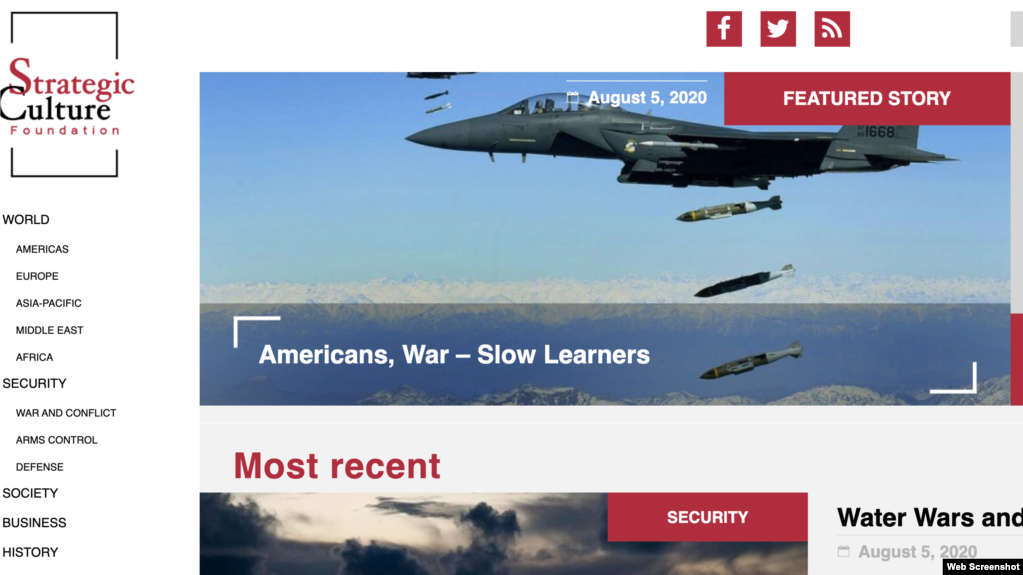U.S. Accuses Russia Of Complex Online Disinformation, Propaganda Operation

A screenshot from the website of the Strategic Culture Foundation, an online journal directed by Russia’s external SVR intelligence agency.
This article was originally published Aug. 5, 2020, on Radio Free Europe/Radio Liberty.
The United States has accused Russia of developing a sophisticated “ecosystem” to spread disinformation and propaganda about the coronavirus and other issues.
In a new report published on August 5, the State Department said Russia’s online operations use “five main pillars” to amplify false narratives and conspiracy theories in a bid to sow confusion and fear.
“Russia is playing a significant role in creating and spreading misinformation and propaganda around many topics,” said Lea Gabrielle, head of the State Department’s Global Engagement Center.
The report does not mention Russian disinformation operations around the 2016 U.S. presidential election or if it is waging another online influence campaign ahead of November’s election. The Global Engagement Center’s mandate is to examine propaganda outside the United States.
Instead, the report mainly focused on the Kremlin’s recent efforts to spread disinformation about the coronavirus pandemic using a mutually reinforcing web of disinformation.
“The ecosystem consists of five main pillars: official government communications, state-funded global messaging, cultivation of proxy sources, weaponization of social media, and cyberenabled disinformation,” the report said.
“The Kremlin bears direct responsibility for cultivating these tactics and platforms as part of its approach to using information as a weapon,” it said.
Most of the report examined websites acting as proxies used to proliferate Russian disinformation and propaganda. The State Department described these news sites or research institutions as “critical connective tissue within the broader ecosystem.”
“We found that they promote disinformation in support of the Kremlin’s goals, they’re often promoted directly by the Russian government, and they push specific disinformation narratives that are picked up by other parts of the ecosystem,” Gabrielle said.
“Russia tries to hide its affiliation with these different proxy sites. That’s what makes them effective, is that it’s difficult for just an average person who is online to look at these sites and know that it’s actually Russian disinformation,” she said.
Chinese, Iran, and Russian disinformation operations often echo each other and use similar tactics.
The report profiled seven such proxy sites, although it said that there are many more of varying size and influence. The websites have peddled conspiracy theories and fringe thoughts on a range of topics, including the coronavirus.
One such proxy is the Strategic Culture Foundation, an online journal directed by Russia’s external SVR intelligence agency. The report said the journal gives a voice to Western fringe thinkers and conspiracy theorists to spread anti-U.S. and anti-Western views while obscuring ties to the Russian government.
Another website is New Eastern Outlook, which the report describes as a “pseudo-academic” publication tied to the Russian Academy of Science’s Institute of Oriental Studies that promotes disinformation and propaganda about the Middle East, Asia, and Africa.
The State Department identified the Canadian-based Global Research as the largest proxy website, describing it as “deeply enmeshed in Russia’s broader disinformation and propaganda ecosystem.”
It said the website has sought to frame the coronavirus pandemic as a Western conspiracy, publishing articles claiming the virus originated in the United States and was developed for the global elite to control the world. One coronavirus article was republished or linked to by more than 70 websites and publications.
In a statement on its Facebook page, the Russian Embassy in Washington said the report was intended to derail cooperation with the United States and discredit alternative sources of information.
“The U.S. State Department is not very fond of the existence of alternative sources of information. Serious resources are employed to discredit them. Any voice that contradicts Washington is dubbed ‘disinformation’ in the service of the ‘Kremlin’ and Russian intelligence,” it said.
Copyright (c) 2019. RFE/RL, Inc. Reprinted with the permission of Radio Free Europe/Radio Liberty, 1201 Connecticut Ave NW, Ste 400, Washington DC 20036.

RFE/RL's mission is to promote democratic values by providing accurate, uncensored news and open debate in countries where a free press is threatened and disinformation is pervasive. RFE/RL reports the facts, undaunted by pressure.
RFE/RL is registered with the IRS as a private, nonprofit Sec. 501(c)3 corporation, and is funded by a grant from the U.S. Congress through the United States Agency for Global Media (USAGM) as a private grantee. All major policy determinations governing RFE/RL operations are made by RFE/RL's Board of Directors. RFE/RL's editorial independence is protected by U.S. law.
BRCC and Bad Moon Print Press team up for an exclusive, limited-edition T-shirt design!
BRCC partners with Team Room Design for an exclusive T-shirt release!
Thirty Seconds Out has partnered with BRCC for an exclusive shirt design invoking the God of Winter.
Lucas O'Hara of Grizzly Forge has teamed up with BRCC for a badass, exclusive Shirt Club T-shirt design featuring his most popular knife and tiomahawk.
Coffee or Die sits down with one of the graphic designers behind Black Rifle Coffee's signature look and vibe.
Biden will award the Medal of Honor to a Vietnam War Army helicopter pilot who risked his life to save a reconnaissance team from almost certain death.
Ever wonder how much Jack Mandaville would f*ck sh*t up if he went back in time? The American Revolution didn't even see him coming.
A nearly 200-year-old West Point time capsule that at first appeared to yield little more than dust contains hidden treasure, the US Military Academy said.












